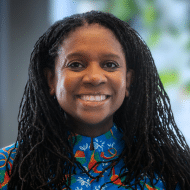
LaShaune P. Johnson
Associate Professor, Department of Clinical Research and Public Health
Creighton University
MFP Cohort 29, 2002-05
Long before I did my first presentation at the Pacific Sociological Association meetings, and long before I became President‐Elect of the Midwest Sociological Society, I was already thinking about how I could use medical sociology to impact health equity and public health. My sociological imagination was awakened in HeadStart, when I would ride with my mom and brother to the healthy grocery stores on “the other side of the tracks” in my hometown of Tulsa, Oklahoma.
Born in the shadows of the ashes of Tulsa’s Black Wall Street, the site of the 1921 Tulsa Race Massacre, I grew up learning that, while my side of town (North Tulsa) had some of the “fun” foods (like French fries and delicious barbeque), the low‐sodium and low‐sugar foods that our family doctors suggested for my chronically ill family members could only reliably be found in the clean, brightly lit stores found on the other side of town.
Staring out of the window of my parents’ sedan, the four‐year old me asked, “Why do we have to drive so far for the good food? When will we get a nice grocery store near our house?” Walking down the aisles of the regional and national chain stores, I would count the different brands and varieties of foods, keeping an eye on my mom, who was shuffling coupons and tracing her “dishpan hands” across the price tags. In addition to noticing the varieties of foods, I noticed the decided lack of variety among the customers, and often felt a pit in my stomach as I watched the mostly White customers and staff stare at my family. I would ask myself, “Are we not allowed to be here? Why do they seem so curious about us? Why does Mama tell us to be quiet here? At our neighborhood store, everyone talks to us and laughs with Daddy. It’s too serious here. We need to make this more fun.” As I got older, I realized these trips to the grocery store represented something quite serious in my life—and the lives of generations of my family. During a high school diagnosis of Hodgkins lymphoma, I was forced to navigate the (pre‐ACA) world of Medicaid and charity care. At the same time I was grappling with these challenges, I took my first sociology class and learned about social capital, the sick role, and racism. Suddenly, there was a glossary to my childhood experiences—my experiences were real, and they were recognized by a rigorous field of study.
So began a career of trying to understand the lived health care experiences of historically and strategically marginalized communities. After a medical leave, I went on to major in Sociology and Medieval/Renaissance Studies at Wellesley College and to get a PhD from the University of California, Santa Barbara. Encouraged by Jon Cruz and Laury Oaks to lean into my artistic background and personal cancer experience, I began to tell stories of Black women who had experienced a breast cancer diagnosis, developing partnerships with breast cancer organizations such as the Linda Creed Breast Cancer Foundation, Sisters Network, Inc., and The Witness Project.
Although my advisors recognized the value of my recording of the stories and experiences of this hidden, multiply‐marginalized Black cancer community and sharing them with the women who would become my family, they also recognized the transformative nature of these stories in public health and clinical medicine. With a bit of coaching and cheerleading, my doctoral advisors pushed me to apply for the ASA MFP. They thought the MFP would help me gain confidence in my voice as a sociologist and also help me, as a first‐generation college student, develop a community of mentors whose personal stories were not unlike my own. Honestly, I don’t remember much about my first ASA Annual Meeting as a MFP fellow. I was starstruck by my sociology ancestors. Was I worthy to be among these scholars? Could I, the granddaughter of Black and service workers, ever become the thought leader that these luminaries were?
My MFP experience helped open the doors for my first NIH postdoctoral experience at the University of Connecticut medical school. There, I was able to participate in the study of bariatric surgery patients and pre‐diabetic Black patients, adding CBPR methods such as Photovoice to help co‐facilitate conversations about race, class, ethnicity, community, and Medicaid policy within and outside of medical settings. At the University of Missouri, I leaned in to the feminist leadership skills I had seen modeled in churches as a child and co‐created community health worker trainings for Muslim women around maternal and child health, and faith‐based breast cancer awareness projects in Black churches. Becoming trained as a culturally responsive evaluator through the LEEAD project, and a certified listener poet through The Good Listening Project, has given me additional ways to use my sociological imagination in my health equity work.
As I reflect upon the years since my time as a Fellow, I cannot help but smile. No, I didn’t grow to become a scholar exactly like my MFP ancestors; I don’t regularly fill auditoriums with students clamoring to learn about my work, nor am I seen adjusting my glasses for a spicy segment on the local primetime news. But I have fulfilled my own kind of promise. Now, as a public health faculty and leader in Creighton University’s community‐engagement efforts, I can actively pursue research and engagement activities that let me feel like that curious four‐year‐ old again. But, today, instead of tentatively holding my mama’s hand, I’m enthusiastically following the lead of my community partners to understand their journeys through health care and my role in helping them change it.